With the WFC drawing to a close we sat down with floorball commentating phenomenon Olly Hogben who has been commentating floorball in the last 2 years. In part one we talked about how it all started, if he has a favorite country and what we can expect during a typical WFC. In this part we take a look behind the scenes of the professional sports commentator and ask how floorball sport differs from other sports in commentating, how he prepares for matches and the hardest moments as a floorball commentator.
[ppp_non_patron_only]This second part is available exclusively for those who support us with a small monthly donation which makes all the work we do at FloorballToday possible for now and in the future. We would be very appreciative if you could become a supporter too and make FloorballToday possible.[/ppp_non_patron_only]
[ppp_patron_only level=”6″ silent=”no”]
You also commentate on a lot of other sports. Which are they and how does floorball differ from them?
So, I’ve done 46 different sports live, across over a dozen multi-sport games and other events. The sport that I’m probably most well-known for is gymnastics, which is about as different from floorball as you can find! Gymnastics, of course, is an individual sport and generally, I don’t speak very much during the action; I use the replays a lot and try to let the routine stand on its own.
[penci_blockquote style=”style-1″ align=”none”]”When you’re commentating floorball you have no time to think!”[/penci_blockquote]
I also do a lot of WTA and Davis/Fed Cup tennis, and it’s the same principle as in gymnastics. So, in gymnastics and tennis, I don’t scream quite as loudly as I do in floorball! But, all sports have some things in common, whether I’m doing gymnastics, floorball, tennis or karate my job is to tell the story, respect the athletes, and not speak when I don’t need to speak.
Probably, the sport that is most like commentating floorball is – strangely – athletics. When I’m commentating on a race the action is incredibly fast and my reactions have to be equally quick; that’s the same for floorball. In floorball your words have to come instantly otherwise you’ll be behind the action the whole time.
How do you prepare for a WFC in general, and a match specifically?
When you’re commentating floorball you have no time to think! In the first two minutes of a soccer match, you can look at the teams and get familiar with who is wearing number 3 and who is the player with the blue highlight in their hair, and so on. In the first two minutes of a floorball match, you might miss three goals if you try to do this!
So, player identification is a vital part of the preparation for me; in the fifteen minutes directly before a match, I read all of the numbers and names aloud at machine-gun pace from my team sheet until I can do the whole thing without a single pause. If I pause for a split second, I go back to the start and do it again.
And in terms of preparing for the match itself, there are a few things I always do; firstly, before the competition starts I prepare my 16 team sheets using my own format, which I update during the competition with goals, assists, and other details. On the day of the match, I prepare a file on each team, including recent head-to-head meetings and current group standings, and I look back at the last WFC match between them. I also try to talk to coaches very briefly to make sure that I am getting pronunciations right, and try to find out interesting information about the players, or whether any records are in danger of being broken.
The other thing that people might not know about my role is that I also help the IFF to decide which matches should have English commentary, which is a very tricky job because I try really hard to make sure that every single team gets at least one match with commentary in the group stage whilst also meeting the needs of international broadcasters who have specific interests.
What are the hardest moments to commentate during a floorball match?
There are two things that are difficult; firstly, when the whistle goes, everyone stops, and I’m not entirely sure why and what has happened! At the start, obviously, this happened to me all the time, but it’s much rarer (hopefully!) now. However, if you haven’t grown up playing the sport, it’s inevitable that obscure and uncommon things will occasionally confuse you. When I have someone like Jurg or Zane Klabere sitting alongside me, like at the last competition, obviously that’s much easier.
The second thing is a more personal one; I’m actually colorblind – although not very severely – and sometimes it can be difficult to read players’ numbers if the number color and the shirt color are not different enough. Occasionally you might notice me struggling with similar-looking numbers, like 10 and 70, or 36 and 88; that usually only happens if I’m finding the color combination hard too. But I have learned lots of tricks over the years to work around this, so it’s not generally a big problem.
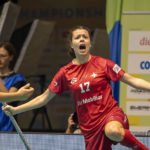
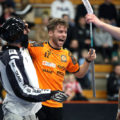

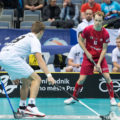
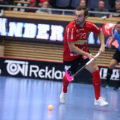
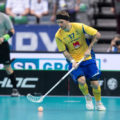
No Comments
Leave a comment Cancel